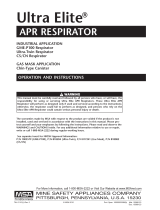Page is loading ...

N95
!
The Do’s and Don’ts of Wearing a Respirator
Respiratory protection products, such as N95 disposable respirators, can help reduce your exposure to
airborne particulates of all sizes, from large visible dust to particles that can’t be seen. When worn
correctly, N95 respirators can help lter at least 95% of certain airborne particles. For this to work, you
need a tight seal of the respirator to reduce contaminated air from entering around the edges. To ensure
a proper t, you need to wear it the right way.
Follow this simple guide to help you put on and wear a 3MTM disposable respirator correctly.
Don’t
Don’t wear the respirator upside down
The metal nose clip helps you create a
custom, secure seal around the nose. If this
is near your chin, the respirator won’t make
a tight seal to your face.
Don’t wear both straps
above or below ears
Wearing the respirator with both straps
above or both straps below your ears also
doesn’t provide a tight seal and t.
Don’t only cover your mouth
For proper protection, you need to cover
both your nose and mouth. If you only
cover your mouth, then you risk breathing
in hazardous particles through your nose.
Don’t wear just one strap
Wearing the respirator with only one strap
doesn’t provide a tight seal and t.
Don’t wear it with facial hair
Sorry, bearded beauties. Beards, long
mustaches and even stubble will cause leaks
into the respirator. To help achieve a good
seal, user must be clean shaven.
Don’t pinch the respirator's
nosepiece with one hand
A pinched nose clip won’t t as well and
can result in a gap at the bridge of the nose.
The nose clip should follow the curves of
your nose and cheeks.
Straps need to be
positioned correctly
User seal check
Form nose clip
with two hands.
• Wear your respirator with the metal nose clip on top to help achieve a secure seal and t.
• The respirator must cover your nose and mouth completely.
• Make sure to use both straps: the upper strap should be positioned on the crown of the head;
the lower strap positioned below the ears.
• Straps shouldn’t be twisted.
• Once respirator is placed on your face, use ngertips from both hands to mold the
nose clip to the shape of your nose.
• Do this by moving your ngertips down both sides of the nose clip.
Always perform a user seal check to help ensure you have a proper seal.
To check the respirator-to-face seal, place both hands completely over the respirator and inhale sharply.
Be careful not to disturb the position of the respirator. A negative pressure should be felt inside the
respirator. If air leaks around nose, readjust the nose piece. If air leaks at the respirator edges, work the
straps back along the sides of your head. If you cannot get a secure seal, look for another respirator
model that ts you correctly.
Do This
*If you have questions, call the 3M technical service helpline at 1-800-243-4630 or in Canada 1-800-267-4414.
Always
read and follow
product-
specic user
instructions.
DIY/Home Use: Use ONLY in NON-HARMFUL environments.
Occupational/Hazardous Use: Use under a regulated government (e.g. OSHA) respiratory protection program.
WARNING: Limitations apply. Misuse may result in sickness or death. See product packaging and insert,
or call 3M in USA at 1-800-243-4630. In Canada, call 1-800-267-4414.
N95
!
N95
!
N95
!
N95
!
N95
!
N95
!
N95
!
N95
!
© 3M 2022. All rights reserved. December 2022
/


